A Bare-Knuckle Fight Over US Election Recounts
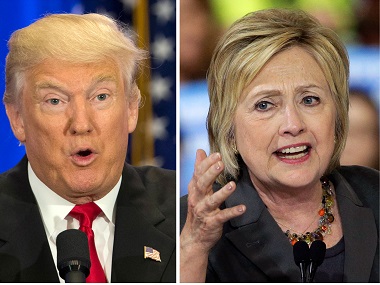
Democrats are trying to stop Donald Trump’s inauguration by claiming Russian interference in the election, but the White House sees no evidence and Trump is now challenging the recounts, reports Joe Lauria.
When the Clinton campaign said it would join the recount in three Rust Belt states narrowly lost to Donald Trump, it didn’t say its motive was overcoming the vote totals but instead to find out if there was “foreign interference” in the election.
“This election cycle was unique in the degree of foreign interference witnessed throughout the campaign,” wrote Clinton campaign counsel Marc Elias.
“The U.S. government concluded that Russian state actors were behind the hacks of the Democratic National Committee and the personal email accounts of Hillary for America campaign officials.”
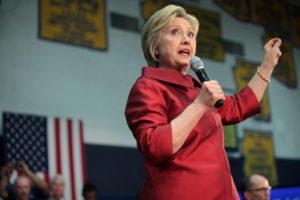
Hillary Clinton speaking at a rally in Phoenix, Arizona, March 21, 2016. (Photo by Gage Skidmore)
During the campaign Hillary Clinton made no secret of where she thought that foreign interference might be coming from. She repeatedly blamed Russia for trying to sway the election.
When the Green Party’s Jill Stein launched her recount campaign in Wisconsin, Michigan and Pennsylvania (the three states that gave Trump the victory), Stein’s announcement quoted her on her website as saying that because “foreign agents” had “hacked into party databases, private email servers, and voter databases in certain states, many Americans are wondering if our election results are reliable.” Stein’s page was then updated to eliminate reference to “foreign agents” in her quote.
But her recount petition filed in Wisconsin begins by saying “it was widely reported that foreign operators breached voter registration databases in at least two states and stole hundreds of thousands of voter records.” The petition then says the U.S. intelligence community is “confident” Russia was behind the hacks. There is “well-documented and conclusive evidence of foreign interference in the presidential race before the election … [that] call[s] into question the results and indicate the possibility that (a) widespread breach occurred,” Stein’s lawyers wrote.
In fact the intelligence community has never made public its evidence for independent computer experts to weigh in on. After the election, the Obama administration said it had no proof of Russian interference in the election tallies and that the results “accurately reflect the will of the American people.”
Citing Press Articles
Nevertheless, Exhibit A in Stein’s petition is an affidavit from Professor J. Alex Halderman, a professor of computer science at the University of Michigan, who alleges that Russia hacked the election. Halderman took part in a conference call with the Clinton campaign last month trying to convince the campaign to seek a recount, which it only did after Stein launched her effort.
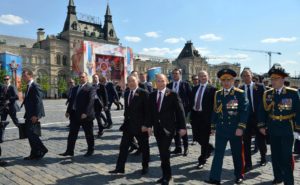
Russian President Vladimir Putin after the military parade on Red Square, May 9, 2016 Moscow. (Photo from: http://en.kremlin.ru)
Exhibit B from Stein’s petition is an article from Wired Magazine about Russia’s alleged role in the hack. Exhibit C is a New York Times article quoting DellSecureWorks, a private security firm, saying Russia was behind the hack of Clinton campaign chairman John Podesta. The company says Podesta clicked on a phishing link to gain access to his account. The Times relied on the company’s word that Russian spies were behind the phishing expedition, without also offering any proof that could be analyzed by other computer security experts.
Exhibits D through G — meaning all of Stein’s exhibits — are on alleged Russian hacking. One article is about an alleged attempted Russian hack of the 2014, post-coup Ukrainian election.
In her many media appearances since launching the recount campaign, Stein has carefully avoided mentioning Russia, or foreign agents, as she inadvertently did in her initial web posting. But her petition is about nothing else but Russia’s alleged hacking of the election.
Scott McLarty, the Green Party national media coordinator, told me in an email last week that the Green Party has “not taken a position on meddling by foreign agents.” Since then, top Green Party officials have distanced themselves from Stein, including her running mate, Ajamu Baraka.
“I’m not in favor of the recount,” Baraka told CNN. He said he told Stein “it was a potentially dangerous move” because it “would be seen as carrying the water for the Democrats.”
Margaret Flowers, the Green’s Senate candidate in Maryland, posted an open letter signed by several prominent party members saying, “While we support electoral reforms, including how the vote is counted, we do not support the current recount being undertaken by Jill Stein.”
The recount, however, does appear to have gotten under the skin of Donald Trump and his allies who, on Friday, went to courts in Michigan, Pennsylvania and Wisconsin, seeking to stop any further examination of the votes. The challenges did not immediately stop the recounts but could create legal complications down the road.
Lobbying the Electors
Since recounts that overturn the vote totals seem unlikely, it appears the Clinton campaign’s Plan B is to use any evidence of tampering that it can pin on Russia to lobby electors to change their votes to Clinton when the Electoral College meets in state capitals on Dec. 19.
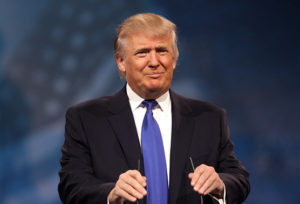
President-elect Donald Trump. (Photo credit: donaldjtrump.com)
Trump won the electoral college 306 to 232. That means 38 Republican electors would have to be convinced to change their vote to Clinton to reach the required 270 to win the White House.
Finding evidence of hacking of election computers that can somehow be blamed on Russia could be crucial for the Clinton team in their effort to convince electors to change their vote.
Russia has been blamed in the U.S. for many things and though proof never seems to be supplied, it is widely believed anyway. It has been accepted as fact by American corporate media, for instance, that Russia invaded Ukraine and had a hand in shooting down Malaysia Airlines Flight MH-17, though the supposed evidence is more argumentative than conclusive.
Emotional appeals to elector’s patriotism and defense of the American system against interference by Russia could make a persuasive argument, however.
At an event at Harvard University on Thursday, Robby Mook, Clinton’s campaign manager, repeatedly blamed Russia for hacking and tampering with the election. “Congress has got to investigate what happened with Russia here,” said Mook. “It is outrageous that a foreign aggressor got involved in our election.”
Robert Reich, labor secretary under President Bill Clinton and a Hillary supporter, argued that one reason the electors should flip to Clinton is to “stop foreign interference in an election.”
Quoting on article, he wrote on Facebook: “The Framers were extremely concerned about infiltration by rivals including Great Britain. In Federalist No. 68, Hamilton wrote that one major purpose of the Electoral College was to stop the ‘desire in foreign powers to gain an improper ascendant in our councils.’ He said that the college would, ‘Guard against all danger of this sort … with the most provident and judicious attention’ from the electors.”
Reich continued: “There’s incontrovertible evidence Russia interfered in the campaign by hacking the email accounts of top Democratic officials and cooperating with WikiLeaks’ parallel campaign to undermine Hillary Clinton campaign.” If such incontrovertible evidence exists, the Obama administration’s intelligence community has not shared it with the public.
Clinton operatives are also making her victory by more than 2 million popular votes part of their appeal to electors to switch sides.
Twenty-four states do not legally bind electors to the popular vote in their states. Elsewhere, electors face fines of about $1,000 if they vote against the will of the people of their states.
Laurence Tribe, a well-known and connected Democratic lawyer, has offered to defend pro bono any elector who breaks the law by changing their vote to Clinton. And there are plans to mount a constitutional challenge against the 26 states that legally bind the electors’ to their state’s popular vote.
Accompanying Media Campaign
The lobbying effort to blame Russia and get the electors to flip their votes is being accompanied by an intense media campaign.
In the announcement that the Clinton campaign would join the recount, campaign counsel Elias aligned the campaign with an unverified Washington Post article based largely on a shadowy, anonymous group that blamed a list of 200 alternative media sites and political groups for spreading Russian propaganda to influence the election, without providing any evidence.
“The Washington Post reported that the Russian government was behind much of the ‘fake news’ propaganda that circulated online in the closing weeks of the election,” Elias wrote.
A Huffington Post article said one of the eight reasons the electors should overturn the election is because “Russian covert action influenced the election.”
The staunchly pro-Clinton Daily Kos wrote that “Even if they never touched a voting machine, there’s absolutely no doubt: Russia hacked the election.”
If evidence of hacking is found in the recounts, the Clinton campaign would be greatly aided in lobbying electors with confirmation from the Obama administration that Russia was behind it. But on the day before the Clinton team joined the recount, the Obama administration appeared to throw a wrench into the plan to blame Russia.
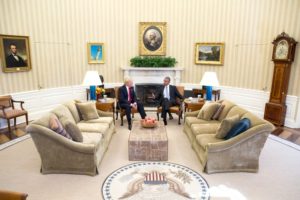
President Barack Obama meets with President-elect Donald Trump in the Oval Office, Nov. 10, 2016. (Official White House Photo by Pete Souza)
The administration said it remained “confident in the overall integrity of electoral infrastructure, a confidence that was borne out,” adding: “As a result, we believe our elections were free and fair from a cyber-security perspective.”
The timing of that statement may have been intended to undermine Clinton as a split was reported between President Obama and Hillary Clinton over whether to have a recount.
Not satisfied with the administration’s conclusion, a group of Democratic senators on Thursday asked that information about Russian hacking should be declassified and released to the public.
White House press secretary Josh Earnest responded that the administration would take a look at the request. But he added that the intelligence community “did not observe an increase in malicious cyber-activity on Election Day from the Russians that was directed at disrupting the casting or counting of ballots.”
Joe Lauria is a veteran foreign-affairs journalist based at the U.N. since 1990. He has written for the Boston Globe, the London Daily Telegraph, the Johannesburg Star, the Montreal Gazette, the Wall Street Journal and other newspapers. He can be reached at [email protected] and followed on Twitter at @unjoe.

